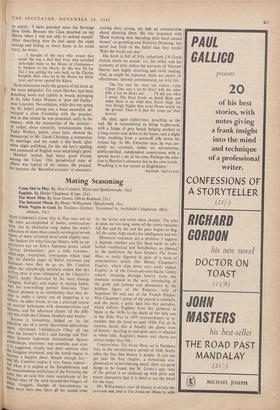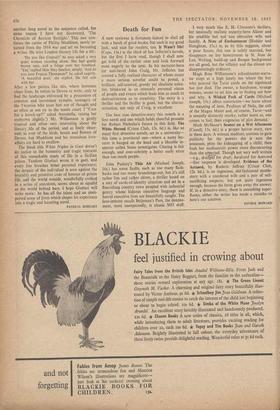Mating Seasoning
The Innocent Moon. By Henry Williamson. (Macdonald, I 8s.) White Nights in Gaol. By Teodoro Giuttari. Translated by Archibald Colquhoun. (Hut- chinson, 15s.)
ALEX COMFORT'S Come Out to Play may not be the most accomplished of books, construction- Wise, but its distinctive tang makes the week's collection of more-than-usually sexological novels (none of them reviewed here) smell slightly sour. The fashion for what George Moore, with an ap- preciative eye on Zola's Japanese prints, called 'furious fornications,' gets a little tiresome: child-rape, voyeurism, love-scenes which read like the showier pages of Stekel, furiouser and furiouser—how they do go on. Mr. Comfort offers the refreshingly heretical notion that Sex is Fun (was it even whispered at the Chatterley trial?), amply illustrated by his hero George Goggins, biologist and expert in mating habits, and his ever-willing partner Dulcinea. Their mutual pleasure is so satisfactory that they de- cide to make a career out of imparting it to others—in other words, to run a practical course On marital techniques with demonstrations and lectures, and for advanced classes 'all the diffi- cult bits from the Chinese, Sanskrit and Arabic.'
Success is immediate, helped on by the jUdicious use of a newly discovered aphrodisiac scent, christened 3-blindmycin (`they all ran after the farmer's wife'), and George and Dul- cinea become important international figures; archbishops, statesmen, top scientists and even, It is suggested, royalty lose their tensions after Loe Goggins treatment, and the world begins to uecome a happier place. Simple enough fun- 411d Mr. Comfort makes it very funny indeed— 'at when it is angled at the Establishment and the sanctimonious politicians of the Friworld, the satire has an acid bite more reminiscent of the 1.1 Wales than of the mild beyond-the-fringers of °day. Goggins, disciple of sansculottism in more ways than one, takes all the sacred cows
by the horns and twists them sharply. The joke is spun out too long, some of the comic episodes fall flat and by the end the pace begins to flag. All the same, high marks for intelligence and wit.
Historical romances are a problem. I suppose it depends whether you like them hard- or soft- boiled—intellectual and Stendhalian, as claimed by the publishers for Jean Giono's The Straw Man, or easily digested in spite of a mass of conscientious detail, like Hester Chapman's Eugenie, which slips down very easily indeed. Eugenie is of the Cavalcade-cum-Sacha Guitry school, sweeping through history from one dramatic moment to the next, introducing all the great and famous and dominated by the brilliant figure of the Empress, wife of Napoleon III and star of the French Empire. Miss Chapman's grasp of the period is scholarly, and she packs a great deal into her narrative, which follows Eugenie from her girlhood in Spain in the 1830s to the death of her only son in the Zulu War in 1879 (extraordinary to re- member that she lived on until 1920). For all its realistic detail, this is frankly the glossy view of history : dazzling in rose-pink satin or ethereal in white tulle, Eugenie's beauty and charm are always larger than life.
Contrariwise, The Straw •Man, set in NortheYn Italy in the revolutionary period of 1848, firmly takes the line that history is people. if you can get past the first chapter, a monstrous con- glomeration of bewildering detail, there are good things to be found, but M. Giono's epic view of the period is so cluttered up with plots and minor characters that it is hard to see the wood for the trees. • Mr. Williamson's view of history is strictly the personal one, and in The Innocent Moon he adds
another long novel to the sequence called, for sbme reason I have not discovered, 'The Chronicle of Ancient Sunlight.' This one con- tinues the career of Phillip Maddison, newly re- turned from the 1914 war and set on becoming a writer. He tries London literary life for a bit:
'Do you like Conrad?' he next asked a very
quiet woman standing alone. She had gentle brown eyes, and a fringe over her forehead. 'Yes,' replied Miss May Sinclair, simply. 'And do you love Francis Thompson?' he asked eagerly. 'A beautiful poet,' she replied. He felt safe with her.
After a few parties like this, where hostesses chase lions, he retires to Devon to write, only to find the landscape enlivened by a procession of constant and inconstant nymphs, teenagers of the Twenties who tease him out of thought and as often as not on to the tennis court. (` "Care for a knock-up?" asked Annabella, raising her eyebrows slightly.') Mr. Williamson is gently ironical and often very interesting about the literary life of the period, and as finely obser- vant as ever of the birds, beasts and flowers of Devon, but Maddison and his tremulous love- affairs are hard to swallow.
The bleak title White Nights in Gaol doesn't do justice to the humanity and tragic restraint of this remarkable study of life in a Sicilian prison. Teodoro Giuttari wrote it in gaol, and every line breathes bitter personal experience; the despair of the individual is seen against the brutality and primitive code of honour of prison life, and the world outside, wonderfully evoked in a series of anecdotes, seems about as squalid as the world behind bars. I hope Giuttari will write more: he has all the talent and an unex- pected sense of form which shapes his experience into a tragic and haunting novel.
PATRICIA HODGART











































 Previous page
Previous page